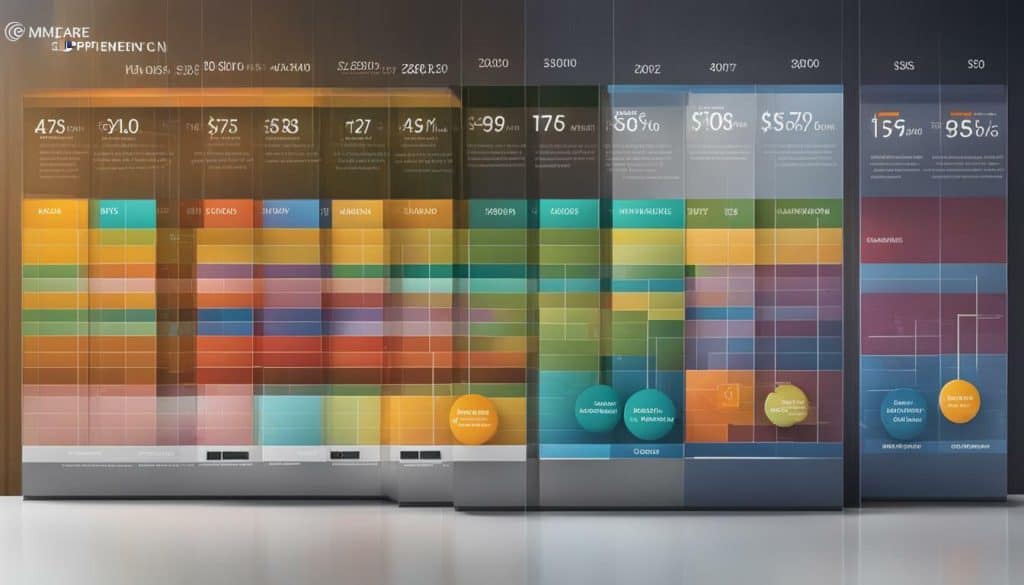Medicare Supplement Plan N is a popular option for Medicare beneficiaries in Pennsylvania, but understanding its cost is essential for making informed healthcare decisions. There are over 40 insurance providers offering 56 Plan N options in the state, and the availability and monthly premium rates for Plan N depend on factors such as location, age, sex, and health status. The cost of Plan N can vary significantly between insurance providers, with the average monthly premium in Pennsylvania being around $230. However, individual premiums can range from $150 to $400.
- The cost of Medicare Supplement Plan N varies depending on factors such as location, age, sex, and health status.
- The average monthly premium for Plan N in Pennsylvania is approximately $230.
- Plan N covers several Medicare costs, but does not include prescription drugs, hearing health, dental care, vision care, or cosmetic surgeries.
- Individuals who were eligible for Medicare on or before January 1, 2020, can still sign up for Plan N.
- Plan G is a suggested alternative to Plan F, as it offers similar benefits without the Part B deductible.
Factors Affecting the Cost of Medicare Supplement Plan N
The cost of Medicare Supplement Plan N can vary significantly depending on factors such as location, age, sex, and health status, which we will explore in this section. Pennsylvania, for example, offers over 40 insurance providers with 56 Plan N options, each with its own pricing structure.
Let’s start by looking at location. The cost of Plan N can vary between different regions within Pennsylvania. Urban areas may have higher premiums compared to rural areas due to the higher cost of living and increased healthcare expenses.
Age and sex are also important factors to consider. Generally, older individuals and females may experience higher premium rates. Insurance providers take into account age-related health risks and trends when determining the cost of coverage. Additionally, women tend to have higher healthcare utilization rates, which can result in increased premiums for female policyholders.
Lastly, an individual’s health status is a significant determinant of the cost of Plan N. Insurance providers may evaluate an applicant’s health history or require them to undergo a medical underwriting process. Those with pre-existing conditions or chronic illnesses may be subject to higher premiums or potential coverage exclusions.

Here is a breakdown of average monthly premium ranges for Medicare Supplement Plan N in Pennsylvania:
| Age | Male | Female |
|---|---|---|
| 65 | $200 – $250 | $230 – $280 |
| 70 | $250 – $300 | $280 – $350 |
| 75 | $300 – $350 | $350 – $400 |
Keep in mind that these ranges are estimates, and actual premium rates may differ based on individual circumstances. It’s crucial to compare pricing and offerings from multiple insurance providers to find the best plan and value for your healthcare needs.
Average Cost of Medicare Supplement Plan N in Pennsylvania
In Pennsylvania, the average monthly premium for Medicare Supplement Plan N is approximately $230, but it’s essential to understand the range of costs associated with this plan. The cost can vary depending on factors such as location, age, sex, and health status. It’s important to evaluate these factors and compare different options before making a decision.
There are over 40 insurance providers offering 56 Plan N options in Pennsylvania, which means there is a wide range of choices available to Medicare beneficiaries. The availability and monthly premium rates for Plan N can differ significantly between insurance providers. Some providers may offer lower premiums, while others may have higher rates.
To give you an idea of the cost range, the monthly premiums for Plan N in Pennsylvania can range from $150 to $400. This variation depends on individual circumstances and the insurance provider you choose. It’s advisable to obtain personalized quotes from multiple insurance companies to find the most suitable and affordable option for your healthcare needs.
| Cost Range for Medicare Supplement Plan N in Pennsylvania | Monthly Premium |
|---|---|
| Lowest | $150 |
| Average | $230 |
| Highest | $400 |
Understanding the cost of Medicare Supplement Plan N is crucial for budgeting your healthcare expenses effectively. It’s important to balance the cost with the coverage provided by the plan. Plan N covers several Medicare costs, including Part A and Part B coinsurance, the Part A deductible, skilled nursing facility care coinsurance, blood transfusion, and foreign travel emergency coverage. However, it’s important to note that Plan N does not cover prescription drugs, hearing health, dental care, vision care, or cosmetic surgeries.

When considering Medicare Supplement Plan N, it’s essential to evaluate your personal healthcare needs and financial situation. It’s also worth exploring alternative options such as Medicare Advantage plans, which can provide additional benefits beyond what Original Medicare covers. These plans may have varying costs, including $0 premiums in some cases, but they also have more restricted choices of doctors and hospitals compared to Original Medicare.
Ultimately, finding the right healthcare coverage requires careful consideration of all available options. By understanding the costs associated with Medicare Supplement Plan N and exploring alternatives, you can make an informed decision that suits your individual needs and budget.
Coverage of Medicare Supplement Plan N
Medicare Supplement Plan N covers several Medicare costs, including Part A and Part B coinsurance, the Part A deductible, skilled nursing facility care coinsurance, blood transfusion, and foreign travel emergency coverage. This comprehensive coverage helps individuals manage their healthcare expenses and provides peace of mind. However, it’s important to note that Plan N does not include coverage for prescription drugs, hearing health, dental care, vision care, or cosmetic surgeries.
It’s essential for Medicare beneficiaries to carefully review the coverage offered by Plan N and consider their individual healthcare needs. While the plan offers robust coverage for Medicare’s core costs, individuals may need to explore additional options for prescription drug coverage or other specific healthcare services. Understanding these limitations will help individuals make informed decisions about their healthcare coverage and budget accordingly.
To illustrate the coverage provided by Medicare Supplement Plan N, here is a table summarizing the included costs:
| Medicare Costs Covered by Plan N |
|---|
| Part A coinsurance and hospital costs |
| Part B coinsurance or copayment |
| Part A deductible |
| Skilled nursing facility care coinsurance |
| Blood transfusion (first 3 pints) |
| Foreign travel emergency coverage |
As individuals evaluate their healthcare options, it’s crucial to weigh the benefits of Medicare Supplement Plan N against any potential out-of-pocket expenses for prescription drugs, dental care, vision care, or other services not covered by the plan. This thorough evaluation will empower beneficiaries to make the best decision for their unique healthcare needs, ensuring comprehensive coverage at a price that fits their budget.

Eligibility and Enrollment for Medicare Supplement Plan N
If you were eligible for Medicare on or before January 1, 2020, you can still sign up for Medicare Supplement Plan N and evaluate its cost as part of your enrollment decision. Plan N is one of the many options available for Medicare beneficiaries in Pennsylvania, offered by over 40 insurance providers with 56 different Plan N options in the state. The availability and monthly premium rates for Plan N depend on factors such as your location, age, sex, and health status.
To give you an idea of the cost, the average monthly premium for Plan N in Pennsylvania is around $230. However, it’s important to note that the cost of Plan N can vary significantly between insurance providers. While the average premium is $230, individuals may encounter premiums ranging from $150 to $400. It’s crucial to consider this expense within your healthcare budget.
| Plan N Coverage | Cost |
|---|---|
| Part A and Part B coinsurance | Included |
| Part A deductible | Included |
| Skilled nursing facility care coinsurance | Included |
| Blood transfusion | Included |
| Foreign travel emergency coverage | Included |
| Prescription drugs | Not covered |
| Hearing health | Not covered |
| Dental care | Not covered |
| Vision care | Not covered |
| Cosmetic surgeries | Not covered |
Along with understanding the cost, it’s important to evaluate your eligibility for Medicare Supplement Plan N. If you were eligible for Medicare before January 1, 2020, you can still sign up for Plan N. Additionally, if you already had or were covered by Plan N before January 1, 2020, you are able to keep your existing plan.
Alternatives to Medicare Supplement Plan N
If you’re considering Medicare Supplement Plan N, it’s essential to explore alternative options such as Plan G and understand the cost and benefits associated with each. Plan G offers similar benefits to Plan N but does not cover the Part B deductible. However, it is important to note that Plan G may have a higher monthly premium compared to Plan N.
Plan N, on the other hand, is often considered a solid alternative to Plan F as it provides comprehensive coverage at a more affordable price. With Plan N, you may be responsible for certain Medicare costs, such as a small copayment for doctor’s visits and emergency room visits. But overall, it can be a cost-effective choice for those looking for comprehensive coverage without the high premium of Plan G or Plan F.
Comparison of Medicare Supplement Plans Plan G and Plan N:
| Plan | Coverage | Cost |
|---|---|---|
| Plan G | Covers all Medicare Part A and Part B coinsurance and copayments, except for the Part B deductible | Higher monthly premium compared to Plan N |
| Plan N | Covers all Medicare Part A coinsurance and copayments, except for a limited copayment for certain outpatient services. Covers all Medicare Part B copayments, except for a small copayment for office visits and emergency room visits | More affordable monthly premium compared to Plan G |
When deciding between Plan G and Plan N, it’s important to consider your healthcare needs, budget, and preference for out-of-pocket costs. Some individuals may prefer the peace of mind that comes with comprehensive coverage, making Plan G a better fit. Others may prioritize cost savings and don’t mind sharing certain costs with Plan N. Comparing the benefits and costs of each plan can help you make an informed decision about which plan best meets your needs.

Medicare Advantage plans, also known as Part C, can be an alternative to Medicare Supplement Plan N, offering additional benefits but with some trade-offs. These plans are provided by private insurance companies and offer a comprehensive approach to healthcare coverage. While Plan N focuses on filling the gaps in Original Medicare, Medicare Advantage plans provide all the benefits of Original Medicare, along with extra perks.
Medicare Advantage plans often include prescription drug coverage, which is not offered by Plan N. This means you can get all your medical and prescription drug coverage in one plan, simplifying your healthcare management. In addition, many Medicare Advantage plans offer additional benefits such as dental, vision, and fitness benefits.
However, it’s important to note that Medicare Advantage plans have more restricted choices of doctors and hospitals compared to Original Medicare. These plans typically have a network of healthcare providers that you must use to receive the full benefits. If you prefer the flexibility to see any doctor or specialist without needing a referral, Medicare Supplement Plan N may be a better fit for you.

When considering Medicare Advantage plans as an alternative to Medicare Supplement Plan N, it’s important to carefully review the plan details and compare them to your specific healthcare needs. Consider factors such as monthly premiums, deductibles, copayments, network restrictions, and coverage for prescription drugs and other services. By weighing the advantages and trade-offs, you can make an informed decision that best suits your individual needs.
Conclusion
Understanding the cost of Medicare Supplement Plan N is crucial for making informed healthcare decisions. Consider your budget, explore alternative options, and choose the plan that best fits your needs.
In Pennsylvania, there are over 40 insurance providers offering 56 Plan N options. The availability and monthly premium rates for Plan N depend on factors such as your location, age, sex, and health status. The cost of Plan N can vary significantly between insurance providers.
The average monthly premium for Plan N in Pennsylvania is around $230, but it could range from $150 to $400. Plan N covers several Medicare costs, including Part A and Part B coinsurance, the Part A deductible, skilled nursing facility care coinsurance, blood transfusion, and foreign travel emergency coverage. However, it does not cover prescription drugs, hearing health, dental care, vision care, or cosmetic surgeries.
If you were eligible for Medicare on or before January 1, 2020, you can still sign up for Plan N. If you already had or were covered by Plan N before January 1, 2020, you can also keep your plan. Alternatively, you may consider Plan G as an alternative to Plan F, as it offers similar benefits without covering the Part B deductible. Plan N is also a solid alternative to Plan F, as it is typically less expensive than Plan G.
Another option to explore is Medicare Advantage plans, also known as Part C. These plans are provided by private insurance companies and offer additional benefits beyond what Original Medicare covers. Medicare Advantage plans have varying costs, including the possibility of $0 premiums. They can provide coverage for items and services not covered by Original Medicare, such as dental, vision, and fitness benefits. It’s important to note that Medicare Advantage plans have more restricted choices of doctors and hospitals compared to Original Medicare.
Ultimately, the decision between Medicare Supplement Plan N and Medicare Advantage plans depends on your health needs and financial situation. Evaluate the costs, benefits, and coverage options to find the plan that best suits your individual needs.
FAQ
Q: What factors influence the cost of Medicare Supplement Plan N?
A: The cost of Plan N can be influenced by factors such as location, age, sex, and health status. These factors can vary the availability and monthly premium rates for Plan N.
Q: What is the average monthly premium for Medicare Supplement Plan N in Pennsylvania?
A: The average monthly premium for Plan N in Pennsylvania is around $230. However, the cost can range from $150 to $400 depending on the insurance provider and individual circumstances.
Q: What does Medicare Supplement Plan N cover?
A: Plan N covers several Medicare costs, including Part A and Part B coinsurance, the Part A deductible, skilled nursing facility care coinsurance, blood transfusion, and foreign travel emergency coverage. However, it does not cover prescription drugs, hearing health, dental care, vision care, or cosmetic surgeries.
Q: Who is eligible for Medicare Supplement Plan N?
A: Individuals who were eligible for Medicare on or before January 1, 2020, can still sign up for Plan N. Those who already had or were covered by Plan N before January 1, 2020, are also able to keep their plan.
Q: What are the alternatives to Medicare Supplement Plan N?
A: Plan G is suggested as an alternative to Plan F, as it offers similar benefits but does not cover the Part B deductible. Plan N is also considered a solid alternative to Plan F, as it is typically less expensive than Plan G.
Q: What are Medicare Advantage plans?
A: Medicare Advantage plans, also known as Part C, are an alternative to Medicare Supplement plans. These plans are provided by private insurance companies and offer additional benefits beyond what Original Medicare covers. They can provide coverage for items and services not covered by Original Medicare, such as dental, vision, and fitness benefits. However, they have more restricted choices of doctors and hospitals compared to Original Medicare.
Q: What are the differences between Medicare Supplement plans and Medicare Advantage plans?
A: Medicare Supplement plans, also known as Medigap plans, are sold by private insurance companies to help cover the gaps in Original Medicare coverage. They offer more predictable and easier-to-budget out-of-pocket costs compared to Original Medicare. However, Medigap plans can be more expensive than Medicare Advantage plans. The decision between the two depends on an individual’s health needs and financial situation.










